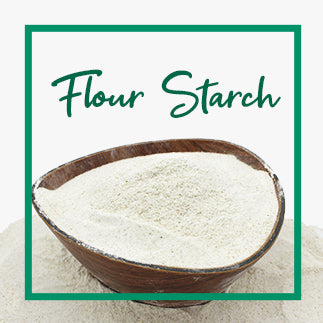Resealable Packaging
Resealable Packaging
UK based

The culinary world is home to many ingredients that may appear similar at first glance. Two such ingredients are flour and starch. Both are commonly used in cooking and baking, making it easy to confuse the two. However, they have distinct properties and uses that set them apart.
Organic Flour is made by grinding various raw materials such as grains, nuts, seeds and roots, while Starch is a carbohydrate that is found in many plants. They are used in different ways in cooking and baking, flour is the main ingredient in many baked goods, while Organic Starch is mostly used as a thickener in sauces and soups.
Despite the similarities, it is important to understand the differences between flour and starch in order to effectively use them in the kitchen.
It is clear that flour and starch are essential ingredients in a wide variety of recipes. They are used in a variety of ways such as thickening agents for sauces, breading for frying, and as key components in baking. It is virtually impossible to create many dishes without using these two ingredients.
Organic starch and organic flour are made from organic grains that are grown without the use of synthetic pesticides, fertilisers, or genetically modified organisms (GMOs).
The process of making organic starch and organic flour begins with the harvesting of the organic grains, which are then cleaned and inspected to ensure that they meet the standards for organic certification.
The grains are then milled to remove the bran, germ, and endosperm, leaving only the starchy endosperm. This starchy endosperm is then further processed to produce organic starch and organic flour.
Organic starch is made by washing the starchy endosperm to remove the protein and fiber, leaving only the starch. The starch is then dried and packaged.
Organic flour is made by grinding the starchy endosperm, along with some of the bran and germ, into a fine powder. The flour is then sifted to remove any remaining large pieces of bran or germ. The final product is organic whole wheat flour.
In short, organic starch is a simple form of carbohydrate that plants store as energy. This is commonly found in cereals such as rice, corn, and wheat as well as crops like potatoes. It is important to remember that plants store their excess energy in the form of starch.
Starch is derived from plants and cereals, but before it is used as an ingredient, it goes through a thorough reduction process. This results in a white, odourless, and tasteless powder that contains traces of carbon, hydrogen, and oxygen atoms.
Starch, a basic type of carbohydrate, is easily broken down into glucose during digestion. Glucose is a vital source of energy for the body and necessary for its proper functioning.
It is evident why starch is widely used in the kitchen, as it has many uses. For instance, it is commonly used as a sweetener and thickening agent in various recipes.
In contrast, organic flour is a powder created by grinding or milling raw grains.
Traditionally, grains are ground into a fine powder by crushing them between stones or wheels. This results in the white powder that is commonly known as flour.
With advancements in technology and the use of modern machinery, the process of making flour has become more efficient over the years, but the basic concept remains the same. There are many types of flour made from cereal grains, some of the most common ones include: wheat flour, rice flour, corn flour, spelt flour, and rye flour.
It is important to note that throughout history, these cereal flours have been used as the primary ingredient for various staple foods across different cultures around the world.
Flour is an essential ingredient for many different types of dishes, it is an indispensable tool to have in the pantry whether you are baking bread, preparing batter, or making sauces.
It is well known that organic flour and organic starch are both incredibly versatile ingredients in the kitchen, the way they are used in cooking and baking is affected by their properties.
It's worth noting that both organic flour and organic starch are effective in thickening sauces. However, starch has a slight advantage in this regard. The following is a brief explanation of the reason why:
Starch is flavourless - The tasteless nature of starch makes it an excellent thickening agent for sauces. It does not affect the taste of the sauce, making it a neutral ingredient. This means that you don't need to make adjustments to the recipe to achieve the desired flavours when using starch, as it simply blends in and allows other ingredients to shine.
Starch enhances the appearance of sauces - When fully mixed into a sauce, starch helps create a glossy sheen, making the sauce appear more attractive and appetising.
Starch does not clump - Home chefs often complain that flour can clump, which makes it necessary to work to smooth out the sauce to achieve the desired consistency. However, this is not an issue when working with starch as it does not clump during the cooking process.
Starch is a more powerful thickener than flour - Starch has twice the thickening capability compared to flour, so you need to use less. For example, instead of using 2 tablespoons of flour, you only need to use 1 tablespoon of starch.
It is important to note that this does not mean that starch should always be chosen over flour when working with sauces. There are also usages of flour, such as:
Flour is versatile - it's important to note that using starch in vinegar-based sauces or any highly acidic mixtures is not recommended as it does not mix well. However, this is not an issue when working with flour as it can be used in a variety of mixtures.
Flour works well with fats - when preparing rich and buttery sauces, flour is the best option to use.
Ultimately, the choice between using organic flour and organic starch depends on the type of sauce you are making. For example, if you're preparing a custard or gravy, starch would be a better choice, whereas if you want a creamy sauce, flour would be a better option.
It's common for people to use the terms "starch" and "flour" interchangeably, but they are actually two distinct substances.
The main difference between starch and flour is that starch is a tasteless, odourless, white solid substance that does not dissolve in cold water and contains carbon, hydrogen, and oxygen atoms, while flour is a powder obtained by grinding raw grains, it is commonly used in baking and cooking to make bread, cakes and pastries.
At Thames Organic Store, we offer a wide selection of Organic Flour & Starch, all sourced from the freshest ingredients. We strive to make your shopping experience effortless and convenient.
Organic coconut palm sugar is a delightful addition to the food world that brings a natural sweetness to your table. At Thames Organic, we pride ou...
View full detailsOrganic Extra Light Granulated Sugar: Pure Sweetness with a Conscious Choice Indulge in the natural sweetness of Thames Organic's Organic Extra Lig...
View full details{"one"=>"Select 2 or 3 items to compare", "other"=>"{{ count }} of 3 items selected"}
